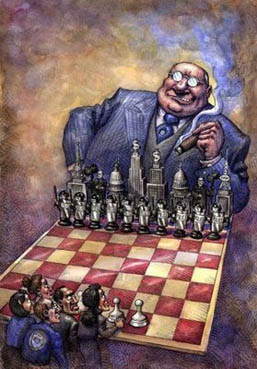By Bruce Wiseman Saturday, May 9, 2009
A towering citadel housing what is essentially a sovereign state known as the Bank for International Settlements is located in Basel, Switzerland. The bank now controls the financial affairs of planet Earth.
If you think this is an exaggeration or the conspiratorial ramblings of the author . . . or not, I invite you to read on. I wrote the first installment of this article—“The Financial Crisis: A Look Behind the Wizard’s Curtain”—in mid-March of this year.

The article included the following statement:
The purpose of this financial crisis is to take down the United States and the U.S. dollar as the stable datum of planetary finance and, in the midst of the resulting confusion, put in its place a Global Monetary Authority—a planetary financial control organization “to ensure this never happens again.”
This purpose has now been accomplished.
The dollar, the former king of currencies, now goes begging in the pant-suited persona of Hillary Clinton to our creditors at the Chinese Communist Party.
Almost unthinkable a few short years ago, the U.S. dollar is fast losing its status as the world reserve currency, and any thought of saving it is being nuked by the Larry, Moe and Curly of U.S. economic policy – Bernanke, Geithner and Summers – and their Alice in Wonderland trillion-dollar budget deficits.
I would not be surprised to see central banks start using the renminbi (the currency of the newly awakened People’s Republic of China—also called the yuan) for international trade and reserves in the not too distant future. This prediction will likely be scoffed at by global economists, but then they have about as much credibility as pharmaceutical salesmen these days.
A more generally discussed alternative is the International Monetary Fund’s SDR (which stands for Special Drawing Rights). There is no production or property behind the SDR. It is one of those clown currencies that are made up out of thin air—a magic trick central bankers like to do. Intoxicated by the power of the purse, they think of themselves as fiscal alchemists.
But the dollar has seen its glory. It can return one day, if Washington ever finds its financial backbone. But let’s be real, with the exception of a very few, like Ron Paul in the House and Tom Coburn in the Senate, these folks are addicted to spending like junkies on horse.
More importantly, the other shoe has dropped. Like some ghoulish predator from another Alien sequel, a Global Monetary Authority has been born. It lives.
THE FINANCIAL STABILITY BOARD
On April 2, 2009, the members of the G-20 (a loose-knit organization of the central bankers and finance ministers of the 20 major industrialized nations) issued a communiqué that gave birth to what is no less than Big Brother in a three-piece suit.
Which means? . . .
The communiqué announced the creation of the all too Soviet sounding Financial Stability Board (FSB)—and no, I’m not going to make a crack about the fact that this acronym is the same as that of the Russian intelligence service that replaced the KGB.
The Financial Stability Board. Remember that name well, because they now have control of the planet’s finances . . . and, when one peels the onion of the communiqué, control of much, much more.
The FSB morphed into existence from an earlier incarnation called the Financial Stability Forum. The Financial Stability Forum (FSF) was established in 1999 to promote international financial stability through co-operation in financial supervision and surveillance. Since it had done such a wonderful job, the central bankers decided to expand its powers and give it a new name.
A board sounds like it has more authority than a forum. But the name change isn’t the problem. The FSB’s broadened mandate includes under point 5, “As obligations of membership, member countries and territories commit to pursue the maintenance of financial stability, maintain the openness and transparency of the financial sector, implement international financial standards (including the 12 key International Standards and Codes), and agree to undergo periodic peer reviews, using among other evidence IMF/World Bank public Financial Sector Assessment Program reports.”
November 3, 2009 at 12:33 AM
Thank you for reprinting the article and for letting me use the image on the book’s Twitter page. Click the link in this article to follow me on Twitter.
Your image is just perfect.